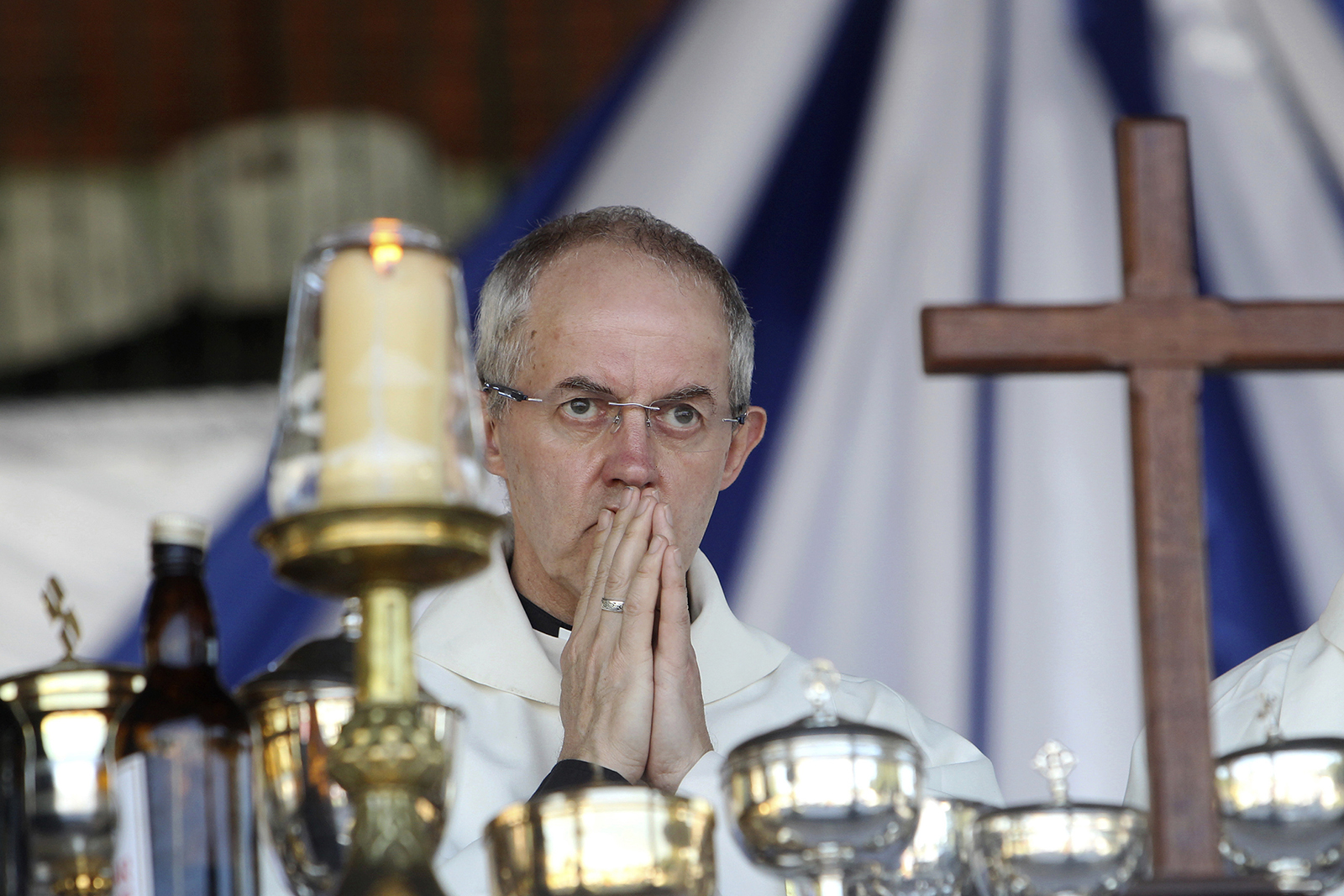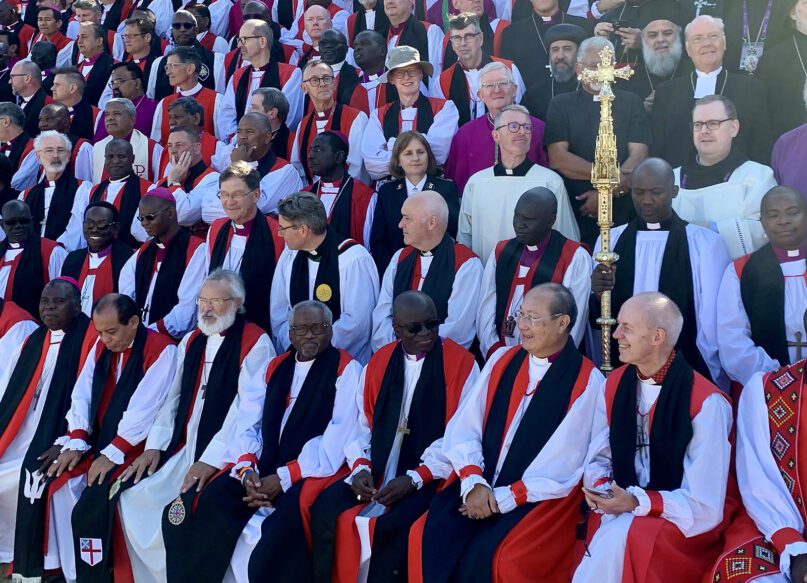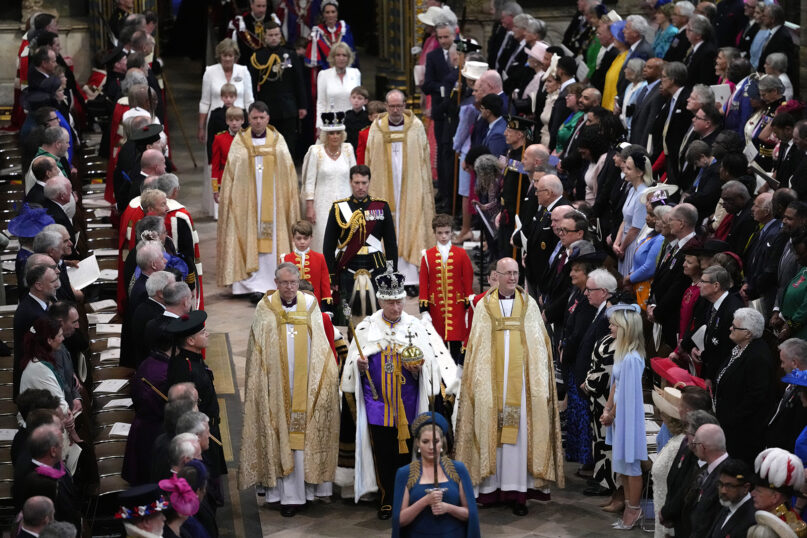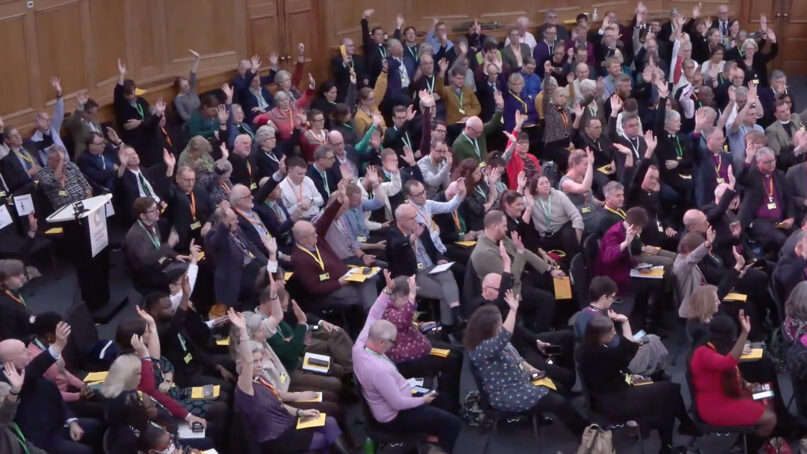
LONDON (RNS) — The Church of England and the wider Anglican Communion are in uncharted waters after the voluntary resignation Tuesday (Nov. 12) of Archbishop of Canterbury Justin Welby.
Welby quit just five days after he vowed that he would not resign, while apologizing for his part in the Church of England’s failure to deal with the serial abuser John Smyth.
Smyth, a Christian and a barrister, first ran activities for boys at a prestigious English private school, Winchester College, then boys’ camps in England before running similar outfits in Zimbabwe and Africa. The results of an independent investigation, called the Makin Review, published on Thursday revealed that various people in the Church of England were aware of Smyth’s savage beatings of boys. The report went on to criticize Welby for his handling of the allegations, which also included “traumatic … sexual, psychological and spiritual attacks.”
According to the review, Welby had come into contact with Smyth through evangelical circles when Welby was in his early 20s and has denied knowing anything of Smyth’s abuse then. In 2013, soon after Welby’s appointment as Archbishop of Canterbury, he was informed of the Smyth case and was told that complaints had been reported to the police. But no formal referral had been made. Instead, the review says, Welby and other senior church figures showed “a distinct lack of curiosity” and “a tendency towards minimization of the matter.”
The combination of outraged abuse survivors demanding Welby’s resignation and a petition garnering thousands of signatures apparently convinced him that resignation was his only option. His resignation statement made it clear he was leaving because he had to take “personal and institutional responsibility” for what had happened since 2013. (Smyth, who died in 2018, was never brought to justice.)

The Anglican bishops attending the Lambeth Conference prepare for their group photograph during the 2022 Lambeth Conference at the University of Kent in Canterbury, England, July 29, 2022. (Photo by Neil Turner for the Lambeth Conference)
No previous Archbishop of Canterbury has resigned his position as leader of the Church of England and spiritual leader of 85 million Anglicans around the globe, making this a unique and seismic moment.
Welby was due soon to announce his retirement when he reached the age of 70 in January 2026, after which church and government leaders expected to have a leisurely 12 months of searching for his successor. That is now forfeited. The archbishop of York, Stephen Cottrell, the second most senior cleric in the Church of England, may be called upon to step in temporarily and lead the Church of England.
At the same time, the Church of England will be under pressure to improve its safeguarding of children and vulnerable adults. Others mentioned in the Makin Review may be expected to follow Welby and resign. On Wednesday, Cottrell told BBC Radio 4’s “Today” program, “We know that some people systematically covered (the Smyth abuse) up and they must be brought to account. A mirror should be held up to the church.”
The church’s deputy lead on safeguarding, Bishop Julie Conalty of the Diocese of Birkenhead, admitted on the same program that the Church of England “has not moved fast enough” on safeguarding. In October 2020, the government-appointed Independent Inquiry into Child Sexual Abuse reported on the Anglican Church, among others, and said the church had not created an effective anti-abuse structure at parish, diocesan and churchwide levels.
Welby and Cottrell later hired the IICSA chair, Alexis Jay, to conduct a Church of England-specific review. In February, Jay recommended that safeguarding be conducted independently of the church, and this week said that the church was dragging its feet.
Others are concerned that Welby has become a scapegoat and that the whole culture of the church has to be examined. Professor Helen King, a lay member of General Synod, the governing body of the church, told a Zoom gathering organized by the Religion Media Center that with the Smyth case, “there are people who knew more than Justin Welby and have done even less.”

Justin Welby, Archbishop of Canterbury, conducts the Bible Exposition on Resistance and Resilience in Venue 1 at the University of Kent during the 2022 Lambeth Conference, Aug. 2, 2022. (Photo by Neil Turner for the Lambeth Conference)
King said she had not agreed previously that a system of safeguarding fully independent of the church was needed, “but we now have to go the full (Alexis) Jay. Reputationally, it just must happen.”
Andrew Graystone, who wrote a revelatory 2021 book about the Smyth case, “Bleeding for Jesus: John Smyth and the Cult of Iwerne Camps,” said that the bishops have to be far less elitist and removed from the rest of the church: “They have to take off their miters and listen to victims.”
According to Bishop Graham Tomlin, the Makin Review and the resignation of Welby “will help culture change,” but many Anglicans will be watching in the next few months to see if that culture change will have an impact on the selection of a candidate to replace Welby.
The first step will be the convening of the Crown Nominations Commission, which will recommend names for Welby’s successor. It will be made up of Cottrell and another senior bishop, as well as six members of the General Synod, three representatives from the Diocese of Canterbury and five from the Anglican Communion who reflect the Archbishop of Canterbury’s role as leader of the Anglican Communion. The fact that the Church of England is an established (state) church is reflected in British Prime Minister Keir Starmer’s role: He will appoint a voting chair; the CNC will make its recommendation to the prime minister, who in turn will convey it to King Charles III, who will make the appointment.

Britain’s King Charles III, front center, and Queen Camilla, middle center, walk in the coronation procession after the coronation ceremony at Westminster Abbey in London, May 6, 2023. (AP Photo/Kirsty Wigglesworth, Pool)
The person chosen will have an enormous role to fill: bishop for the Diocese of Canterbury, primate of all England, a member of Parliament’s House of Lords and the spiritual head of the Anglican Communion.
The age 70 retirement age will rule some people out — and rule in others in their mid-50s. When it was thought Welby would leave on his 70th birthday, Cottrell, at just two years younger, was assumed to be too old. Now, he might get the job if the CNC moves fast, giving him a three-year stab at being an interim leader.
Other conventional choices may be Martyn Snow, bishop of Leicester, who has worked on interfaith issues, as well as taking the lead on Living in Love and Faith, the Church of England’s project to reach agreement on human sexuality. Snow adroitly managed not to alienate conservatives nor progressives in that process, but as Welby’s pick for the next archbishop, he may now be doomed.
Michael Beasley, bishop of Bath and Wells, is thought to be a candidate for high office, but he was involved in the church’s response to COVID-19, which led to churches being closed and was hugely unpopular.
The CNC may opt for Paul Williams, bishop of Southwell and Nottingham, who has the support of the evangelicals, who mostly oppose further change on gay relationships. With the evangelicals also comes money, always a useful component of church life.

Church of England General Synod attendees vote on a motion for closure on an item, Nov. 15, 2023, in London. (Video screen grab)
There are less conventional candidates to consider. The first diocesan bishop to come out and publicly call for Welby to resign, Bishop of Newcastle Helen-Ann Hartley, boosted her own cause to succeed Welby, but the church may not yet be ready for a woman in the top job. If it is, another likely candidate is Bishop of Chelmsford Guli Francis-Dehqani, an Iranian and former refugee who speaks eloquently on social justice issues.
Could a candidate for Canterbury come from outside the Church of England? It happened with Rowan Williams, from the Church in Wales. But coming from farther afield might be tricky, given the Archbishop of Canterbury is an establishment figure, sitting in the House of Lords.
But having an African, say, being responsible for crowning the next monarch could do wonders for diversity and Britain’s future relationship with the Commonwealth. King Charles III, who is Supreme Governor of the Church of England, might well be delighted.
